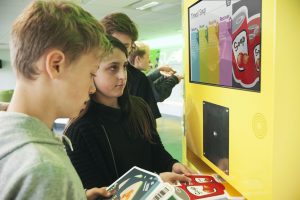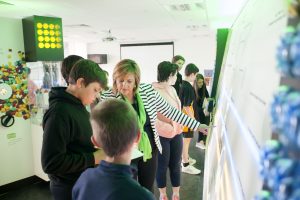How do we support STEM education and outreach work post Covid-19?
13th July 2020
We know how important outreach work is, especially when encouraging interest in STEM subjects and careers.
Going on field trips and listening to assembly talks from outside visitors are amongst my strongest memories from school.

I was lucky to grow up in the Netherlands which has long been hailed as one of the countries leading the way on environmental practices. I can still remember the presentations at school from recycling experts and the visits to see peatland restoration, which both inspired and made me think.
Children often think that maths and science can be ‘boring’ or that they are ‘not clever enough to be an engineer’. Outreach helps open up the possibilities to careers in STEM by encouraging problem solving and creative skills as well as showing the various career options.
In short, this is as much about confidence and opening up possibilities as it is about teaching skills.
It is best to start at an early age and there is a wealth of research to support this. However, we also know that there will be multiple challenges for our teachers and schools as they reopen in September. Firstly, in helping students catch up on school work and secondly, educating in a world where social distancing measures have become common place.
So how do we marry these two needs and still encourage interest in STEM subjects?
I strongly believe that companies who work in STEM based areas can do their bit to help. In my role as Communications Director at SUEZ recycling and recovery UK, I look after our outreach team, one of whom is Natalie Chard. Natalie is a former teacher who heads up our community liaison team in Cornwall and supports our wider education programme. I spoke to Natalie to get her views on supporting STEM education and outreach work in a post-covid environment.
How have things changed in your role following the start of the pandemic?
Myself and my team look after all engagement with the local community in Cornwall, which includes organising beach cleans, delivering educational talks in schools and to local groups, and running our two visitor centres, one at a materials recycling facility and the other at an energy from waste plant.
Since March, I have had to review and adapt the way we engage with schools and communities. With suspended tours, I have used the time to develop virtual lessons, presentations, tours and webinars for consultations.
Our visitor centres will soon start to gradually reopen. How have you prepared our centres?
New Covid-19 risk assessments have been carried out and visitor numbers have been reduced to a maximum of six to ensure social distancing can take place safely. Visitor routes through the plant have been adapted to ensure the safety of our operational staff in the control room at the energy from waste facility. Face masks, gloves and hand sanitisers will be provided for all visitors. Headsets, hard hats and safety glasses have been grouped into batches of six and will be sanitised and rotated so they are not reused with 72 hours.
What will be the key challenges for schools?
In the first few weeks, teachers will be faced with the enormous challenge of getting children back into a daily routine of lessons and overcoming any anxieties with returning to school life.

The ‘bubble’ system will mean that teachers will be with their class for the duration of the day including breaks and lunch times. This means teachers may have less time for scheduled planning and preparation or even a lunch break. As a former teacher, I know this is usually the time to set up the classroom for the next lesson and prepare resources to aid the teaching.
Consistency will be a challenge with different schools having to adapt to routines and safety measures that best fit their own needs. Unfortunately, one size doesn’t fit all, so staffing levels, size of classes and individual school requirements, all need to be considered.
Ensuring that lessons are still engaging with Covid-19 restrictions in place will be another challenge. For example, a lot of Primary schools will organise a school trip for a particular topic to put the subject into context, ignite imagination and help the class gain a better understanding. However, with current circumstances, it is unlikely that school trips will happen at least during the first term, if not longer.
How do you think the face of education will change after the summer?
I hope there will be more time given to focus on wellbeing. We have seen a lot of studies stating that anxiety in children has increased during this pandemic. At SUEZ UK, we are supporting our employees with managing stress, anxiety, sleep and coping mechanisms, life skills we should all have. Therefore, I believe there is great value in teaching our children these skills alongside the curriculum.
Why is outreach still important in the curriculum?

Natalie talking to students at our Cornwall energy from waste visitor centre earlier this year
Outreach work helps to put the learning into context, it answers the question – why do I need to learn about this? This is particularly important for STEM based subjects.
It helps to inspire and raise aspirations of children and nearly everyone I speak to can remember a school trip they went on, but not necessarily what they learnt in school that term.
It helps to embed the learning and give greater detail that teachers may not necessarily have on that topic.
How do you think outreach programmes will change in the future?
Initially this will have to be done virtually as most schools will not be allowed to have people entering their ‘bubble’ once established.
As restrictions relax further and we can start to go into schools, we will have to adapt what we deliver to ensure that resources can either be left at the school or sanitised thoroughly before being used in other schools.
The number of children we work with may be reduced, for instance, we are unlikely to be presenting to a whole school assembly for some time.
However, I am confident that we can adapt and maintain outreach programmes and interest in STEM subjects in a new way. It is critical to children’s education and the skills we need to develop in future generations.
Tweet